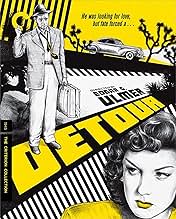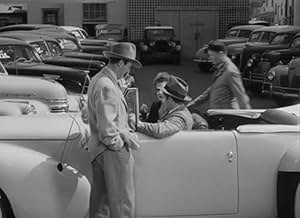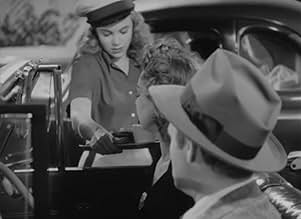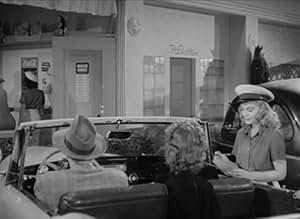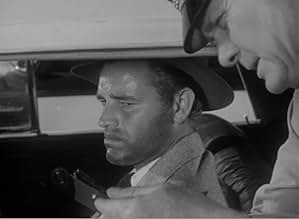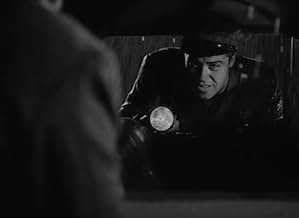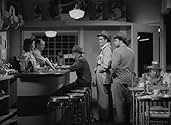A vida de Al Roberts, pianista de uma boate nova-iorquina, se transforma em um pesadelo quando ele decide pegar carona até Los Angeles para visitar a namorada.A vida de Al Roberts, pianista de uma boate nova-iorquina, se transforma em um pesadelo quando ele decide pegar carona até Los Angeles para visitar a namorada.A vida de Al Roberts, pianista de uma boate nova-iorquina, se transforma em um pesadelo quando ele decide pegar carona até Los Angeles para visitar a namorada.
- Direção
- Roteiristas
- Artistas
- Prêmios
- 1 vitória no total
- Used Car Salesman
- (não creditado)
- Cop
- (não creditado)
- Tony - Used-Car Lot Mechanic Inspecting Car
- (não creditado)
- Nightclub Patron
- (não creditado)
- California Border Patrolman
- (não creditado)
Avaliações em destaque
Neal is effective as a man who seems on the surface to be a victim of bad luck and poor judgment. Real bad luck and real poor judgment.
Trying to get from New York to LA by hitchhiking so that he can be with his girlfriend, Al, a talented pianist, is picked up by a guy named Haskell, who, at some point during the ride, dies of we don't know what - probably heart failure. The guy kept taking pills of some sort - my guess is it's digitalis because if it were speed, he wouldn't have fallen asleep.
At any rate, his death leaves Al with a dead body and a car. Feeling no one will believe his story, he hides the body, changes clothes with the victim, takes Haskell's driver's license and money, and leaves. First mistake.
Surely an autopsy would have confirmed the man died of heart failure, number one; and number two, Al in his narration makes reference to the body falling out of the car when he opened the door, indicating that there would then be a bump on the head and he'd then be accused of hitting him.
Uh, Al, I doubt it - the ground was wet and the guy was DEAD. But instead of driving to the nearest police station and explaining what happened, Al takes off.
Later on, he picks up a hitchhiker named Vera. It turns out that she knows he isn't Haskell and uses her knowledge to get him to do what she wants to get more money. If it was downhill in the beginning, now the situation becomes a sheer drop.
There is speculation by viewers that Al is a big fat liar and that his narration, which makes him look like a victim of chance, is skewed, that the facts don't fit his story and that his girlfriend Sue didn't exist.
That is a very interesting way to look at this film, and that conjecture may be true. On the other hand, Al may just be a loser and the victim of bizarre circumstances.
The whole film, and I saw a very grainy print of it, has a bizarre atmosphere. In the New York section, as Sue and Al walk through the streets, there's a fog machine going nuts, giving rise to the conjecture that Sue and Al's romance with her are just in his imagination.
The character of Vera is frightening and pathological; one minute she wants to be treated like a woman by being complimented, and she comes on to Al, and the next, she's threatening him and acting like a shrew. More inconsistencies.
The hard-looking Ann Savage is savage indeed in the role, which is by necessity a quite exaggerated portrayal. Handsome Tom Neal does a good job as Al, and his role includes a substantial narration throughout.
Is this narration what really happened, or is it what he is planning to tell the police if caught? We don't know. The ending was tacked on at the last minute and frankly doesn't feel right.
I like the idea of the ambiguity of the original ending, which matches the ambiguity of the story. The viewer does see this ending, but then it is followed up by another minute of film apparently demanded by the censors.
With Neal's subsequent real-life violent actions and his ultimately being accused of murdering his wife, this film takes on some really macabre aspects.
"Detour" will always remain perhaps the most unusual noir ever produced: made for no money, the strange circumstances of the story, a character who may or may not be lying to the audience, and a leading man who perhaps took his role too seriously. A striking film.
The story feels more than a little strained on more than one occasion. It's hard not to fall in love the hopelessness that constitutes Detour. A low-budget thriller directed by Edgar G. Ulmer. Sure, it's an extremely simple B-movie, but it is packed full of interesting quotes, friendly cynicism, pitch black darkness and at least as much rain. It is insanely entertaining to see Vera and Al throw sharp barbs at each other while the tones are so miserable that they find it hard to laugh at them.
With a playing time of over 70 minutes says Detour goodbye long before it has time to start to feel tiring.
What makes "Detour" a must see, is the clever way its narrative unfolds on the screen. Al and Sue are seen first in the small bistro he plays the piano and she sings, in Manhattan. Sue sings a happy rendition of "I Can't Believe You're in Love with Me", and Al shows he can improvise on a theme by Chopin as he jazzes it up. When Sue decides to pack it and move to L.A., Tom promises he'll follow. The tragic mistake he makes is to intent crossing the country hitchhiking. Even in the forties, it's a miracle he made it alive!
In Arizona Al meets the kind Charles Haskell, who happens to be going all the way to L.A. and offers him a ride. The two men develop an easy friendship until the point when Haskell dies of an apparent heart attack. Al disposes of the body and keeps going, assuming now, Haskell's persona. At the nearest gas station he sees a pretty woman, Vera, who appears is hitchhiking, and offers her a ride. This will prove to be his biggest mistake.
Vera turned out to be Al's worst nightmare. She knows Al is not Haskell since she, herself, knows the man. Al ends up a virtual prisoner hiding in the apartment they have rented in Hollywood. He can't escape. When Vera realizes there's a lot of money to be made by having Al pretend to impersonate the dead Haskell, he refuses. She threatens to call the police and he is left on the other room pulling the telephone cord...
The film works because all the elements are in place in this satisfying 67 minutes work and because of the great performances Mr. Ulmer got out of Tom Neal and Ann Savage. Edmund MacDonald and Claudia Drake played Haskell and Sue.
"Detour" was shot in two sets and it shows. It's a small film that doesn't pretend what it's not, and that's basically why audiences seem to like it as it's discovered.
When his fiancée heads to Los Angeles to try for the lush life, he lets her go, then, suddenly lonesome, decides to hitch out to the coast. In Arizona, he thumbs a ride from a pill-popping driver (Edmund McDonald) with scratches on his wrist from tussling with a 'wild animal' a woman he had picked up in Louisiana. When Neal takes over the wheel during a rainstorm, McDonald up and dies and conks his head on a rock as he slumps out the passenger door. Looks bad. Since he casts himself as eternal victim, Neal, though blameless, guiltily drags the body into the desert and assumes its identity (along with car and wallet). Later, at a gas station, he offers a lift to another thumb-jockey (Ann Savage), even though she looks like she 'just got thrown off the crummiest freight train in the world.' (Does the phrase 'self-destructive' strike a familiar note?) In fact, she's none other than the beast who sank her claws into the deceased and plans to make an even bigger feast out of Neal....
The stubble on Neal's unshaved chin can't disguise his pouty, pretty-boy looks, and he proves just right as this callow, ill-starred loser (a better actor would have added superfluous dimensions). If he and his self-absorbed predicament start to wear a little thin, it ceases to matter when Savage arrives halfway through to give a performance that beggars all description. Owing either to Ulmer's or her own genius (or to exigent production values), her hard face stays stripped of glamor when she does slap on the war paint, the effect is primitive, alarming, with eyebrows that looked slashed on with a stiletto under an unkempt riot of hair. She starts off slowly, until, supposedly dozing in the shotgun seat, her eyes fly open to size up and devour Neal. It's the most terrifying instant in Detour. From then on in, she's all shrew all the time, drunk or sober, intimidating or seductively manipulative. Thus Savage's Vera entered film history as the hardest-boiled of its femmes fatales. And Neal never knew what hit him.
Insolently original a classic in a class by itself Detour is by no stretch of the imagination a conventional masterpiece (if masterpieces can be counted as conventional). It shows evidence of starting out to be something a longer, more fully developed movie quite different from what it ended up . Groundwork gets laid for developments that never come to pass. What seems to be intended as the plot's centerpiece a scheme to pass Neal off as McDonald, the lost scion of a wealthy family comes to nothing. As does Savage's ominous cough, a clue to her subsequent indifference ('I'm on my way anyhow') to that 'perfume Arizona hands out free to murderers.'
Somewhere along the way, Detour ran out of time, or money, or film stock, and was cobbled together out of footage already in the can, with the aid of peculiar voice-overs (in the last-ditch manner of The Magnificent Ambersons or My Son John). Against all odds, it still worked, and remains one of the best known and most unforgettable titles in the film noir canon, a stunningly effective piece of work that manages to encapsulate, in 67 minutes, all the inchoate angst that informs the cycle. It may have been an accident, but it's the kind of accident you can't peel your eyes off of.
When the noir cycle began to coalesce in the early 1940s, it looked like it was going to take the high road of starry, big-budget prestige productions (The Maltese Falcon, I Wake Up Screaming, The Glass Key, Laura, Double Indemnity, Mildred Pierce). Edgar G. Ulmer's Detour took the low road. A Poverty-Row production empty of box-office names, it was shot on a few cheap sets in a matter of days. But it sweated off a raw power that other alert film-makers working on the fringes of the industry were quick to emulate; the next few years would see Fall Guy, The Guilty, Suspense, Violence, I Wouldn't Be In Your Shoes, Decoy (the pick, along with Detour, of this particular litter) all done with wannabes or has-beens in cast and crew, visually often ugly (the murky lighting more a matter of necessity than moody esthetic choice). It was often inspired movie-making on the most frayed of shoestring budgets.
And yet, with a few exceptions, this second-feature slot was the niche into which film noir would settle until it ran its course in the late 1950s. Which raises a question: Without Detour paving the way for quick-and-dirty, sensational fodder to fill up double bills B-movies that the suits in the front offices didn't much care about and so paid little attention to would the noir cycle have been but a brief flash in the pan? Would it have stayed the passion only of a handful of French cineastes? Would it have amounted to a cycle at all? The debt owed to Detour may be greater than acknowledged.
Você sabia?
- CuriosidadesWhile the crew was setting up to film a hitchhiking scene, a passing car tried to pick up Ann Savage (made up to look dirty and disheveled), causing the crew to break out laughing.
- Erros de gravaçãoIn the first shots of Al hitchhiking, the film is reversed. The cars are driving on the wrong side of the highway and the drivers sitting behind the wheel are sitting on the right side of their vehicles.
- Citações
Al Roberts: Money. You know what that is, the stuff you never have enough of. Little green things with George Washington's picture that men slave for, commit crimes for, die for. It's the stuff that has caused more trouble in the world than anything else we ever invented, simply because there's too little of it.
- ConexõesEdited into Michael Jackson: This Is It (2009)
- Trilhas sonorasI Can't Believe That You're in Love with Me
(uncredited)
Written by Jimmy McHugh and Clarence Gaskill
Performed by Claudia Drake
Played often in the score
Principais escolhas
- How long is Detour?Fornecido pela Alexa
- Who is the young actress that plays the "car-hop" and brings the tray to the car?She looks a lot like the young Marilyn Monroe
Detalhes
- Data de lançamento
- País de origem
- Centrais de atendimento oficiais
- Idioma
- Também conhecido como
- Detour
- Locações de filme
- 9263 Sierra Highway, Actis, Califórnia, EUA(Vera hitchhiking at Richfield gas station called Actis Service Station)
- Empresa de produção
- Consulte mais créditos da empresa na IMDbPro
Bilheteria
- Orçamento
- US$ 30.000 (estimativa)
- Faturamento bruto nos EUA e Canadá
- US$ 16.172
- Fim de semana de estreia nos EUA e Canadá
- US$ 5.127
- 2 de dez. de 2018
- Faturamento bruto mundial
- US$ 16.172
- Tempo de duração1 hora 6 minutos
- Cor
- Proporção
- 1.37 : 1
Contribua para esta página


![Assistir a Trailer [OV]](https://m.media-amazon.com/images/M/MV5BZGEyYTUwNDQtN2ZjZi00YmY2LWE2ZjUtOTY3NjQ3NDQ0Zjg3XkEyXkFqcGdeQXRyYW5zY29kZS13b3JrZmxvdw@@._V1_QL75_UX500_CR0)
